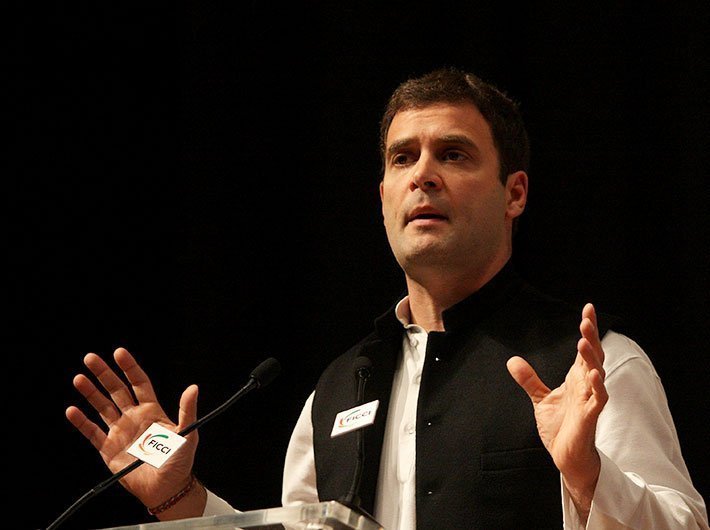There’s yawning gap between ‘kathni’ and ‘karni’ everywhere – and people know that
Self-deception is an essential trait of a revolutionary, particularly of the Marxist variety. Rahul Gandhi as the Congress president seems too eager to internalise this trait in his politics.
If you have any doubt, look at his latest tweet which is divinely prophetic in its content.
It says, “I stand with the last person in the line. The exploited, marginalised and the persecuted. Their religion, caste or beliefs matter little to me. I seek out those in pain and embrace them. I erase hatred and fear. I love all living beings. I am the Congress”. Needless to say that the tweet got maximum retweets from party supporters.
He could have as well replaced “I am the Congress” with “I am the Buddha / I am the Geeta / I am the Christ / I am the Prophet”.
There is nothing wrong in this tweet except the fact that it is a patently dishonest exposition from the chief of the country’s oldest party which had steadfastly adopted truth and nonviolence as its guiding light till India’s independence. Mahatma Gandhi, known as apostle of truth, was quite averse to using language to camouflage the intentions.
In this case, nobody can grudge Rahul Gandhi’s entitlement to self-deception. But his efforts to delude the masses by employing saintly rhetoric need to be countered effectively. Given the inclusive personality of India’s first prime minister Jawaharlal Nehru and the legacy of other great Congress leaders, the party was indeed beyond caste and communities in those days. Nehru’s political philosophy, largely influenced by Gandhi, truly transcended parochial barriers.
But caste turned out to be a harsh reality in the post-Nehru era. And the Congress since then dabbled into sectarian strife so much that it changed the political contours of the country. The party’s leadership was largely confined to a strong section of upper castes and it contrived benignity towards Dalits and minorities for decades. On the other hand, the Congress’s influence in the OBC’s was effectively challenged Ram Manohar Lohia. In Tamil Nadu and Kerala, the Congress lost ground to Annadurai and the CPM that attracted marginalised and minorities.
Politics hardly follows linear course. The Congress’s political trajectory since the seventies followed a course that tapped on social fault lines. Take for instance, there is hardly any evidence when either Indira Gandhi or any other Congress leaders stood up against the mob when riots happened across the country in the seventies and eighties quite unlike Gandhi and Nehru who cared two hoot about their lives to challenge murderous mobs in Noakhali (Bengal) and Delhi after the independence.
The first notably communalised elections in India happened after Indira Gandhi’s assassination in 1984. Rahul Gandhi’s father, Rajiv Gandhi, reaped maximum benefits from it. This was followed by another experiment of opening up the Ram Janma Bhoomi temple in Ayodhya in 1987. The obvious intention was to consolidate Hindus with a fond belief that Muslims could not go anywhere else. That the expectations were belied does not undermine the party leadership’s cynical pursuit of power by dividing the society on caste and communal lines.
In today’s context the Congress is outmaneuvered in this pursuit of power by other political parties, particularly regional outfits, which believed in eminent social scientist Rajni Kothari’s theorisation on caste, that politics of caste would lead to politicalisation of caste. In regional parties of north India, politics of caste also led to extreme lumpenised empowerment of castes and communities. And there is hardly any party that has insulated itself from this political infection. Even Hindutva politics thrived on successful coalition of castes. Of course, emergence of prominent leaders like Mayawati, Mulayam Singh Yadav, Lalu Prasad Yadav and Nitish Kumar in Uttar Pradesh and Bihar is related to assertion of Dalits and OBCs.
Similarly, the BJP besides banking on Hindutva has doggedly pursued the caste groups as they found OBC faces as leaders as a powerful means to coalesce Hindu society. This is the precise reason why Modi’s “chaiwala” antecedents were always used to the hilt to drive home the point that the BJP belonged as much to OBCs as to the upper castes. Without saying it openly, the BJP found exclusion of Muslims as a given in the present political context. But they realised it rather too soon that caste cannot be ignored in Indian politics.
This harsh reality has prompted the Congress to attempt to forge a coalition with outright casteist groups in North India. Rahul’s love for Mayawati, Akhilesh and Lalu is driven more by the fact that they command influence over caste groups than mere abstraction. In the Gujarat and Karnataka elections, he peddled soft Hindutva by running around temples and tried to maintain caste balance by keeping Jignesh Mevani and Hardik Patel in good humour. This is the context behind his Twitter post – even if it sounds like god-ordained words from a messiah. Perhaps it would be better if he responds politically without messianic pretence. Even if he does not know it, people know it too well that politics is not a pious game.
[This is comment has appeared on FirstPost.com]

